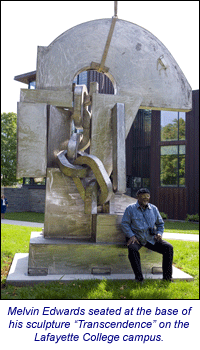Black Faculty at Berkeley Has Not Recovered From the Ban on Affirmative Action in Hiring Decisions
 Last week JBHE reported the decline in the percentage of black faculty at the 10 campuses of the University of California since the ban on affirmative action in hiring decisions was enacted a decade ago. While the number of black faculty systemwide has increased slightly, the percentage of the total faculty who are black has dropped from 2.7 percent in 1996 to 2.4 percent in 2007. Last week JBHE reported the decline in the percentage of black faculty at the 10 campuses of the University of California since the ban on affirmative action in hiring decisions was enacted a decade ago. While the number of black faculty systemwide has increased slightly, the percentage of the total faculty who are black has dropped from 2.7 percent in 1996 to 2.4 percent in 2007.
At the Berkeley campus, the most prestigious of the University of California system, the impact has been more severe. At Berkeley there were 43 black tenure or tenure-track faculty members in 1996. The number of black faculty dropped to 31 by 2003, a decrease of 28 percent. Since that time the number of black ladder faculty at Berkeley has increased to 38. But this is still five fewer black faculty than the number teaching on this campus before the ban on affirmative action in faculty hiring went into effect. In 1996 blacks were 3.5 percent of the tenure or tenure-track faculty at Berkeley. By 2007 blacks were 2.8 percent of all ladder faculty members.

SCRIPPS COLLEGE

President
Scripps College seeks an exceptional president to achieve its vision: to become the premier women’s college in the United States.
The next president of Scripps College will have a record of high achievement and proven leadership, with a deep and demonstrated commitment to the liberal arts and a passion for the value and values of women’s education. The president will possess the requisite intellectual gifts and credentials necessary to lead an elite women’s liberal arts college with a unique inter-disciplinary approach to learning. The president will personify the core values of the College and will be its forceful and effective advocate in leading the institution, seeking philanthropic support, implementing the College's strategic plan, and representing Scripps within the Claremont University Consortium.
Scripps’ next president will lead the College during a period of unprecedented opportunities. With its spectacular campus, a strong financial position, a history of fund-raising success, a dedicated Board of Trustees, active and loyal alumnae, and, above all, faculty and students committed to exceptional academic and personal excellence, Scripps is now poised to become a national and global leader in the education of women, and its next president will guide Scripps to achieve that goal.
Recruitment will continue until the position is filled. Nominations, expressions of interest, and applications (including a cover letter and resume) should be submitted electronically to the consultants supporting Scripps College in this search, Dennis M. Barden, Robin G. Mamlet, and Gaele E. McCully, at ScrippsPres@wittkieffer.com.
This search will be conducted with the utmost respect for candidate confidentiality. Inquiries and questions concerning this search may be directed to Dennis M. Barden at 630-575-6167, Robin G. Mamlet at 610-544-3474, or Gaele E. McCully at 781-564-2624.
Scripps College is an Equal Opportunity Employer.

Black Enrollments at Some Florida Public Universities in Free Fall
 The flagship campus of the University of Florida in Gainesville reports that there are 671 black freshmen on campus this fall. This is a whopping decrease of 27 percent. The flagship campus of the University of Florida in Gainesville reports that there are 671 black freshmen on campus this fall. This is a whopping decrease of 27 percent.
At Florida State University in Tallahassee, there are 460 black freshmen. This is a decline of 15 percent. At the University of South Florida in Tampa, black enrollments are off 15 percent.
A survey by admissions officials for the University of Florida system found that half of the black families surveyed said that they were not sending their children to college due to financial reasons.
Florida A&M University, the historically black campus of the state system, saw first-year enrollments increase by 23 percent.
Virginia Tech Invests in Racial Diversity
 Virginia Tech has announced plans to spend $1 million over the next five years to increase racial and ethnic diversity on campus. The money will be spent on student recruitment, student outreach programs, faculty recruitment efforts, and curriculum development which will attract minority students and faculty. The university hopes to hire six new minority faculty members in each of the next two years. Virginia Tech has announced plans to spend $1 million over the next five years to increase racial and ethnic diversity on campus. The money will be spent on student recruitment, student outreach programs, faculty recruitment efforts, and curriculum development which will attract minority students and faculty. The university hopes to hire six new minority faculty members in each of the next two years.
Blacks make up 4.5 percent of the total enrollments at Virginia Tech.
Fortieth Anniversary for a Pioneering Black Studies Program
 Blacks make up only one percent of the population in the state of Montana. Therefore, readers will be surprised that not only does the University of Montana have a black studies program, but it has had one for 40 years! Blacks make up only one percent of the population in the state of Montana. Therefore, readers will be surprised that not only does the University of Montana have a black studies program, but it has had one for 40 years!
The university established its black studies program in 1968, well before many of today’s leading black studies programs and departments were founded. The program was founded by Ulysses Doss, a civil rights activist who worked with Martin Luther King Jr.
Surge in Black First-Year Enrollments at Rutgers University
 Rutgers University, regarded as one of the most diverse institutions of higher education in the United States, reports a record number of freshman enrollments. More than 6,000 students enrolled at the main campus of Rutgers University this fall. More than half of the incoming students are non-Caucasians. Rutgers University, regarded as one of the most diverse institutions of higher education in the United States, reports a record number of freshman enrollments. More than 6,000 students enrolled at the main campus of Rutgers University this fall. More than half of the incoming students are non-Caucasians.
Universitywide, black first-year enrollments are up 13 percent from a year ago. Blacks are 9 percent of all enrollments at the flagship New Brunswick campus. African Americans are 17 percent of all undergraduates at the Camden campus and 19 percent of total enrollments on the Newark campus.
Significant Enrollment Gains at Historically Black Talladega College
 When Billy C. Hawkins took over the reins as president of Talladega College in Alabama this past January there were slightly more than 300 students on campus. President Hawkins instituted his “Each One, Reach One” recruitment drive where every student was encouraged to recruit one additional student to enroll at the historically black college, which maintains an affiliation with the United Church of Christ. When Billy C. Hawkins took over the reins as president of Talladega College in Alabama this past January there were slightly more than 300 students on campus. President Hawkins instituted his “Each One, Reach One” recruitment drive where every student was encouraged to recruit one additional student to enroll at the historically black college, which maintains an affiliation with the United Church of Christ.
The students responded. Although the goal of Each One, Reach One was not met, enrollments now stand at about 500, with 200 in the freshman class.

ARIZONA STATE UNIVERSITY

10 Tenure/Tenure Track Faculty Positions
The College of Teacher Education and Leadership of Arizona State is an innovative and rapidly growing college dedicated to preparing and supporting professionals for today’s and tomorrow’s schools. Through collaboration with educational and civic communities, our goal is to get students ready to take on the role of school and community leader, applying evidence-based knowledge and intuition informed by scholarship to make a difference with Arizona students, teachers, families, and communities. Our faculty is distinguished by their professional accomplishments in research, their passion for service, and by a distinctive ethos of teamwork and commitment to improvement-oriented study of our own professional practice. The College offers programs at the bachelor’s, master’s and doctoral levels and is presently serving more than 1700 students.
The College invites applications for 10 tenure/tenure track faculty positions. Appointments will begin August 17, 2009.
Division of Teacher Education
- Early Childhood Education: Assistant Professor
- Educational Psychology: Assistant Professor
- Literacy K-12: Assistant/Associate Professor
- Mathematics Education K-12: Assistant/Associate Professor
- Science Education K-12: Assistant/Associate Professor
- Special Education: Assistant/Associate/Full Professor
- Subject Area K-12 and Director of Partnerships: Associate/Full Professor
Division of Educational Leadership and Innovation
- Educational Foundations: Assistant/Associate/Full Professor
- Special Education: Assistant/Associate/Full Professor
- Subject Area K-12: Assistant/Associate/Full Professor
Application deadline: November 1, 2008; if not filled, then weekly thereafter until search is closed. AA/EOE. For detailed descriptions of each position, required and desired qualifications, and application procedures, please visit the ASU College of Teacher Education and Leadership website at http://ctel.asu.edu/jobs/.

Report Finds That Black Women Are More Likely Than Black Men, White Men, or White Women to Leave Tenure-Track Positions
 A report to be published next month by the National Association for Equal Opportunity in Higher Education finds that black women in the academic world are more likely to leave tenure-track positions — either voluntarily or involuntarily — than black men and more than men and women of other ethnic groups. The data obtained from surveys conducted by the National Science Foundation, shows that black women were twice as likely as men and women in other racial and ethnic groups to voluntarily leave a tenure-track position to take a post as an adjunct faculty member. And black women were less likely than other groups to be retained in tenure-track posts by colleges and universities. Also, black women who received postdoctoral fellowships were more likely than men and women in other ethnic groups to be unemployed at the conclusion of their fellowships. A report to be published next month by the National Association for Equal Opportunity in Higher Education finds that black women in the academic world are more likely to leave tenure-track positions — either voluntarily or involuntarily — than black men and more than men and women of other ethnic groups. The data obtained from surveys conducted by the National Science Foundation, shows that black women were twice as likely as men and women in other racial and ethnic groups to voluntarily leave a tenure-track position to take a post as an adjunct faculty member. And black women were less likely than other groups to be retained in tenure-track posts by colleges and universities. Also, black women who received postdoctoral fellowships were more likely than men and women in other ethnic groups to be unemployed at the conclusion of their fellowships.
 William A. Darity Jr., an economist at Duke University and one of the authors of the study, told JBHE, “The retention differentials are much, much wider between black and white scholars than they are between black male and black female scholars.” He is convinced that racism in the academy plays a key role in the differentials. William A. Darity Jr., an economist at Duke University and one of the authors of the study, told JBHE, “The retention differentials are much, much wider between black and white scholars than they are between black male and black female scholars.” He is convinced that racism in the academy plays a key role in the differentials.
Appointments
 • Louis Molamu, registrar at the University of South Africa, is spending the current academic semester as a visiting professor at North Carolina Central University in Durham. He is teaching courses on business and behavioral sciences. • Louis Molamu, registrar at the University of South Africa, is spending the current academic semester as a visiting professor at North Carolina Central University in Durham. He is teaching courses on business and behavioral sciences.
Molamu is a graduate of the University of Fort Hare and holds a master’s degree from Bradford University in the United Kingdom.
 • LaDelle Olion was appointed dean of graduate studies and sponsored research at Fayetteville State University in North Carolina. He has been on the university’s faculty since 1982. • LaDelle Olion was appointed dean of graduate studies and sponsored research at Fayetteville State University in North Carolina. He has been on the university’s faculty since 1982.
Dean Olion is a graduate of Southern Illinois University, where he also earned a master’s degree. He holds a doctorate in educational psychology from the University of Connecticut.
 • Derrick Ramsey, who played nine seasons in the National Football League, was named director of athletics at Coppin State University in Baltimore. Ramsey was the deputy secretary of commerce for the Commonwealth of Kentucky. • Derrick Ramsey, who played nine seasons in the National Football League, was named director of athletics at Coppin State University in Baltimore. Ramsey was the deputy secretary of commerce for the Commonwealth of Kentucky.
 • Claibourne D. Smith was named acting president of Delaware State University. Dr. Smith, who is chair of the university’s board of trustees, is a retired executive of DuPont. • Claibourne D. Smith was named acting president of Delaware State University. Dr. Smith, who is chair of the university’s board of trustees, is a retired executive of DuPont.
Smith is a graduate of the University of Denver, where he also earned a master’s degree in chemistry. He holds a Ph.D. in organic chemistry from the University of Oregon.
 • Carl Carpenter was appointed executive vice president for academic affairs at Voorhees College in Denmark, South Carolina. He had served as interim president of South Carolina State University. • Carl Carpenter was appointed executive vice president for academic affairs at Voorhees College in Denmark, South Carolina. He had served as interim president of South Carolina State University.
Dr. Carpenter holds bachelor’s and master’s degrees from South Carolina State University and an educational doctorate from the University of South Carolina.
 • Russell T. Jones, professor of psychology at Virginia Tech, was appointed to the community health in disasters committee of the U.S. Department of Health and Human Services. • Russell T. Jones, professor of psychology at Virginia Tech, was appointed to the community health in disasters committee of the U.S. Department of Health and Human Services.
Dr. Jones is a graduate of Western Michigan University. He holds a master’s degree and a Ph.D. from Penn State.
Grants
• Harris-Stowe State University, the historically black educational institution in St. Louis, received a five-year, $2.5 million grant from the National Science Foundation for a program to increase the number of black students training to become mathematics and science teachers. Some of the funds will be used to start a summer bridge program that will prepare incoming freshmen for college-level courses in mathematics and science.
 • The University of Tennessee received a five-year, $500,000 grant for a research project examining the participation of women and minorities in the sciences and other technical fields. The principal investigator on the project is Terrell L. Strayhorn, associate professor of higher education at the university. • The University of Tennessee received a five-year, $500,000 grant for a research project examining the participation of women and minorities in the sciences and other technical fields. The principal investigator on the project is Terrell L. Strayhorn, associate professor of higher education at the university.
• Delaware State University, the historically black educational institution in Dover, received a $150,000 grant that will be used to complete the university’s Music Technology Lab. The lab includes six workstations for students in classes on song writing, music technology, and sound production.
• Johnson C. Smith University, the historically black educational institution in Charlotte, North Carolina, shared in a $500,000 grant from the Duke Endowment. The money is targeted for programs to make the campus more environmentally friendly.
• Spelman College, the historically black educational institution in Atlanta, received a $1 million grant from the Ford Foundation, for its Women’s Research and Resource Center.
|
Black Enterprise Magazine’s Bizarre Rankings of the Nation’s Colleges and Universities
 Every two years Black Enterprise magazine publishes its list of the “Top 50 Colleges for African Americans.” This year, it rated Spelman College in Atlanta as the best college for blacks. Howard University, Morehouse College, and Hampton University ranked in the next three spots. Georgetown University, in fifth position, was the highest-ranked predominantly white institution. Every two years Black Enterprise magazine publishes its list of the “Top 50 Colleges for African Americans.” This year, it rated Spelman College in Atlanta as the best college for blacks. Howard University, Morehouse College, and Hampton University ranked in the next three spots. Georgetown University, in fifth position, was the highest-ranked predominantly white institution.
Fisk University, a historically black university with a distinquished tradition, ranked in eighth position in the Black Enterprise survey. Yet, the college is in dire financial straits. It has an overall graduation rate of 64 percent. Yet Fisk is rated a better college for African Americans than Harvard University or Amherst College! Both Harvard and Amherst were ranked No. 1 as the best colleges in the United States by U.S. News & World Report. Also, Harvard and Amherst have highly diverse student bodies and black student graduation rates greater than 90 percent.
Black Enterprise ranks Dillard University in New Orleans in 30th position despite the fact that the university was recently placed on probation by its accreditor, its enrollments are down since Hurricane Katrina, and its graduation rate is under 50 percent. Dillard is ranked higher by Black Enterprise than Duke, Berkeley, and the University of Virginia.
The Black Enterprise rankings are highly inconsistent with the magazine’s own past rankings. For example, in 2004 Morehouse College in Atlanta was rated by Black Enterprise magazine as the best college in America for African Americans. Two years later, Morehouse was ranked by Black Enterprise as the 45th best college for blacks. This year Morehouse is back up to third. In 2004 Xavier University in New Orleans, which turns out more blacks for U.S. medical schools than any other undergraduate institution in the nation, was ranked fifth in the Black Enterprise survey, higher than any predominantly white college or university in the United States. In 2006 the university didn’t even make the top 50 in the Black Enterprise rankings. Now Xavier is ranked 17th.
In 2006 Florida A&M University was ranked as the best college for blacks. Now it has dropped all the way to 18th position.
These extremely inconsistent results raise serious doubts about the reliability of the latest effort by Black Enterprise magazine to identify the 50 best colleges for African Americans.
  |
 “The House HBCU Caucus will work to expand federal opportunities for these institutions. We will strive to ensure the future success of our nation’s HBCUs, and to uphold their traditions.” “The House HBCU Caucus will work to expand federal opportunities for these institutions. We will strive to ensure the future success of our nation’s HBCUs, and to uphold their traditions.”
— Eddie Bernice Johnson, Democratic congresswoman from Texas, announcing the formation of a new bipartisan caucus in the House of Representatives that will seek to represent the legislative interests of the nation’s black colleges and universities
|
Lafayette College Honors Its First Black Graduate
 This Saturday Lafayette College in Easton, Pennsylvania, will dedicate a new 16-foot sculpture on the north side of its campus library. The four-ton sculpture titled “Transcendence” is dedicated to David Kearney McDonogh, the college’s first black graduate. The work was created by internationally renowned sculptor Melvin Edwards. This Saturday Lafayette College in Easton, Pennsylvania, will dedicate a new 16-foot sculpture on the north side of its campus library. The four-ton sculpture titled “Transcendence” is dedicated to David Kearney McDonogh, the college’s first black graduate. The work was created by internationally renowned sculptor Melvin Edwards.
 McDonogh received a bachelor’s degree from Lafayette College in 1844. He is thought to be the only black American slave to earn a college degree while still in bondage. His owner, a planter from Louisiana, sent McDonogh to Lafayette College to train him for the ministry and for repatriation to the African nation of Liberia. McDonogh received a bachelor’s degree from Lafayette College in 1844. He is thought to be the only black American slave to earn a college degree while still in bondage. His owner, a planter from Louisiana, sent McDonogh to Lafayette College to train him for the ministry and for repatriation to the African nation of Liberia.
After graduating from Lafayette, McDonogh went to New York City where he served as an apprentice to a white physician at New York Hospital and the New York Eye and Ear Infirmary. His master, a generally benevolent man for his time who allowed all his slaves to work to buy their freedom, made no attempt under threat of force to bring McDonogh back to Louisiana. Although he received no formal training, McDonogh opened a medical practice in Manhattan and served black and white patients for more than 40 years. He died in 1893 at the age of 72.
It would be more than a century after McDonogh earned his degree before another African American graduated from Lafayette College.

MCLENNAN COMMUNITY COLLEGE

President
McLennan Community College invites applications for the position of College President. The position will be available September 1, 2009.
Since 1966, MCC has continually evolved to better meet the educational and cultural needs of its students, the McLennan County community, and Central Texas. The scenic MCC campus is built on nearly 200 acres in northwest Waco situated 96 miles south of Dallas and 100 miles north of Austin. As well as being a beautiful campus, MCC is one of the most technologically up-to-date community colleges in Texas.
MCC is a comprehensive community college governed by a Board of Trustees elected from seven single member districts representing McLennan County. The school’s annual budget is more than $38 million and enrolls over 8,000 students each semester. The school has more than 20 buildings and is currently building three new ones, thanks to a $74.5 million bond passed by voters in 2006.
For more information about MCC, the Presidential Profile, qualifications, and the electronic application process, applicants may visit www.mclennan.edu/presidentialsearch. Applications will be received until 5 p.m. on Friday, Oct. 10, 2008.
For additional information, please contact Renee Ramos, Senior Executive Assistant to the President at 254-299-8140 or at rramos@mclennan.edu.
McLennan Community College provides equal educational opportunity for all qualified students and does not discriminate on the basis of gender, disability, race, creed or religion, color, age, national origin or any other unlawful factors in its educational programs, activities, or employment.

New Study Finds That African-American College Students Have the Lowest Rate of Cigarette Smoking
 A new report from the American Lung Association finds that 19.1 percent of American college students smoke cigarettes. This is the lowest level since 1980. In 1999 more than 30 percent of all college students smoked cigarettes. Smokers were defined as anyone who had at least one cigarette in the 30 days prior to the survey. A new report from the American Lung Association finds that 19.1 percent of American college students smoke cigarettes. This is the lowest level since 1980. In 1999 more than 30 percent of all college students smoked cigarettes. Smokers were defined as anyone who had at least one cigarette in the 30 days prior to the survey.
College students are significantly less likely to smoke than young people of college age who are not enrolled in higher education. Thirty-five percent of youth ages 18 to 22 who are not in college are smokers.
White college students are more likely to be smokers than any other ethnic group. Asian Americans and Hispanic Americans are less likely to smoke than whites but are more likely to smoke than blacks. On college campuses, African Americans are the ethnic group least likely to smoke cigarettes.
The Value of Racial Diversity in Medical Education
 A new study conducted by the Higher Education Research Institute at the University of California at Los Angeles suggests that students who attend medical schools with a high degree of racial and ethnic diversity make better doctors than students who go to medical schools that have a low level of diversity. A new study conducted by the Higher Education Research Institute at the University of California at Los Angeles suggests that students who attend medical schools with a high degree of racial and ethnic diversity make better doctors than students who go to medical schools that have a low level of diversity.
The study, published this month in the Journal of the American Medical Association, examined whether “white students educated in a racially diverse environment show a greater sensitivity to the healthcare needs of traditionally underrepresented minority populations.” Over a two-year period the researchers surveyed more than 20,000 medical school graduates from 118 different medical schools.
The results show a direct correlation between the racial diversity of their medical schools to the graduates’ views on whether they were prepared to care for patients from racial groups other than their own. The results also showed that graduates of racially diverse medical schools were more likely than other medical school graduates to endorse the idea that quality medical care is a societal right rather than a privilege.
The authors conclude that medical schools are justified in using affirmative action to increase the racial diversity of their student bodies. The racial diversity at these schools produced doctors that, according to the authors, are better prepared to provide healthcare to an increasingly diverse population.
In Memoriam
Yakubu Saaka (1945-2008)
 Yakubu Saaka, a professor of African-American studies at Oberlin College in Ohio, died late last month in Johannesburg, South Africa. He was 62 years old. Yakubu Saaka, a professor of African-American studies at Oberlin College in Ohio, died late last month in Johannesburg, South Africa. He was 62 years old.
Professor Saaka had taught at Oberlin College for 36 years. He served in parliament in Ghana and as the nation’s ambassador to the United Nations. Earlier this year, he unsuccessfully ran for president of the African nation.
Leroy Chauffe (1936-2008)
 Leroy Chauffe, who taught chemistry at California State University East Bay for 33 years, died in Hayward, California, from complications of diabetes. He was 71 years old. Leroy Chauffe, who taught chemistry at California State University East Bay for 33 years, died in Hayward, California, from complications of diabetes. He was 71 years old.
Professor Chauffe taught undergraduate and graduate courses and served as chemistry department chair. He also was associate dean of instruction and acting dean of graduate studies.
A native of New Orleans, Dr. Chauffe graduated from Xavier University of Louisiana. He went on to earn a master’s degree from Howard University and a Ph.D. in organic chemistry from the University of California at Davis.

URSINUS COLLEGE

Full-Time Faculty Positions
URSINUS COLLEGE is a highly selective, nationally ranked, independent, co-educational, residential liberal arts college of approximately 1700 students located on a beautiful campus 25 miles northwest of center city Philadelphia. The College is continuing to expand the faculty to broaden our offerings in the arts, enhance interdisciplinarity, and enrich the overall academic program, and actively seeks candidates strongly committed to excellence in teaching and research in a liberal arts setting. Dedicated to liberal education and to fostering student achievement through undergraduate research and creative work, the College invites applications from candidates who are eager to teach in an interdisciplinary freshman liberal studies seminar and to mentor undergraduate students in research and creative projects.
Ursinus College invites applications for the following full-time, tenure-track faculty positions beginning in Fall 2009:
- Studio Art: Painting and Drawing (Visiting)
- Chemistry
- Economics
- Environmental Sociology
- Genetics/Cell Biology
- Mathematics and Computer Science
- Medieval and Early Modern European History
- Religious Studies
- Spanish
Complete job descriptions and application guidelines can be found at: http://www.ursinus.edu/jobs
Ursinus is an EEO/AA employer. In keeping with the College’s historic commitment to equality, men and women and members of all racial and ethnic groups are encouraged to apply.

Honors and Awards
 • Norman L. Mebane Jr., CEO of his own trucking and investment firms in Windsor, North Carolina, and a member of the board of trustees of Elizabeth City State University, was honored for his contributions to the university by having a street on campus named in his honor. Norman L. Mebane Drive is outside the university’s fine arts center. • Norman L. Mebane Jr., CEO of his own trucking and investment firms in Windsor, North Carolina, and a member of the board of trustees of Elizabeth City State University, was honored for his contributions to the university by having a street on campus named in his honor. Norman L. Mebane Drive is outside the university’s fine arts center.
• Charlayne Hunter-Gault, one of two students in 1961 to integrate the University of Georgia, received the 2008 Mickey Leland Humanitarian Achievement Award from the National Association for Multi-Ethnicity in Communications association. Hunter-Gault is now a foreign correspondent for National Public Radio.
  |
64% Percentage of all white parents in 2007 who reported that they were “very satisfied” with their children’s K-12 school.
47% Percentage of all black parents in 2007 who reported that they were “very satisfied” with their children’s K-12 school.
source: U.S. Department of Education
|
|
 .
.